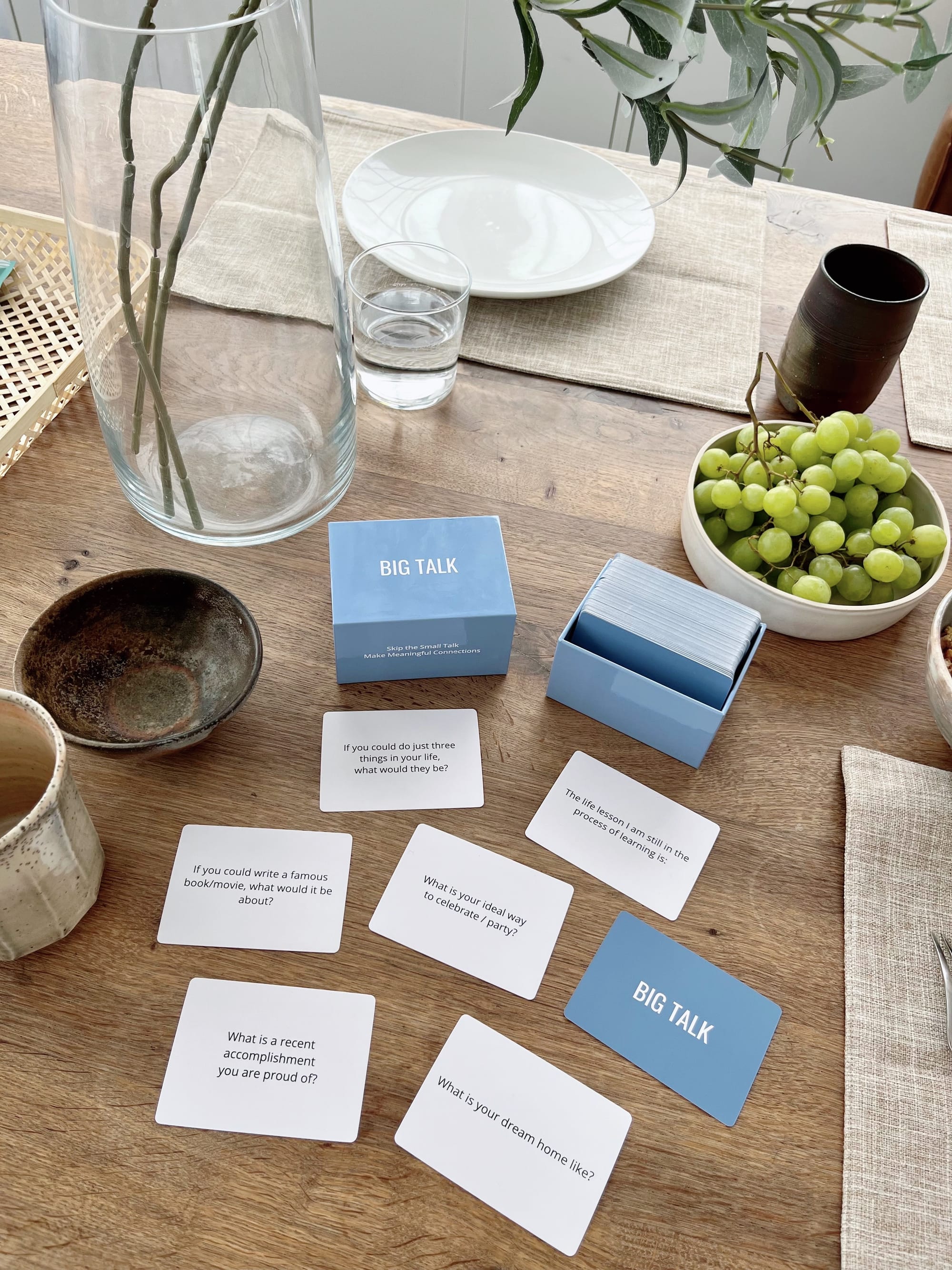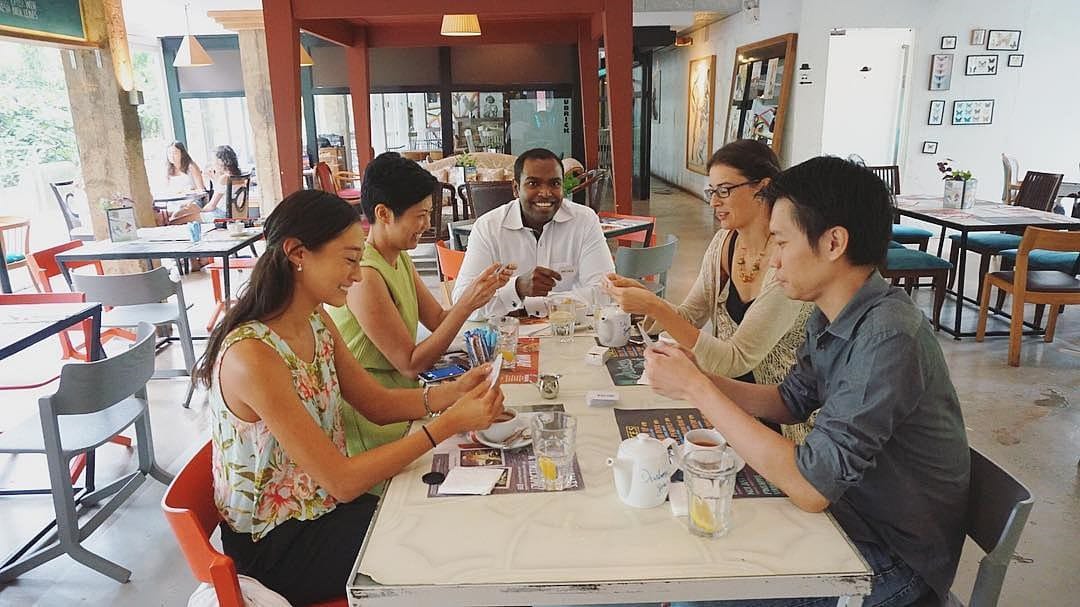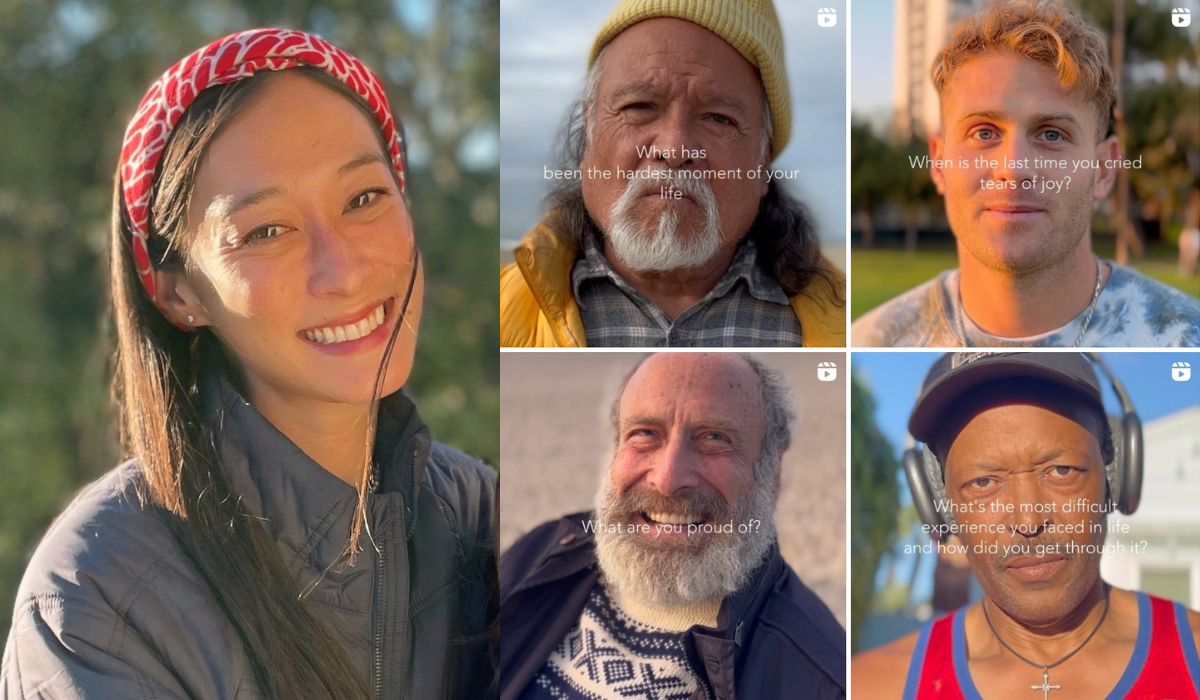Forget Small Talk—It’s Time for “Big Talk” Says Kalina Silverman, Whose Viral Movement is Curbing Loneliness and Creating Connection
Almost 10 years ago, Kalina Silverman was in a new city living a busy life—attending events, signing up for activities, and meeting new people all the time. Yet she still felt intense loneliness at the end of each day. One night during a deep conversation over FaceTime, Kalina’s friend said, “Wow, I wish more conversations could be like this. This is the connection I need right now. Screw small talk.” Something clicked—while she was taking part in plenty of conversations, what she craved was big, deep connection and in order for our connections to be big, so did our talk.
Chatting with The Sunday Paper, Silverman shares how Big Talk went from an aha moment to a worldwide movement.
A CONVERSATION WITH KALINA SILVERMAN
Take me back to the beginning. Where did 'Big Talk' begin?
It was almost 10 years ago that I moved to a new city for the first time—Chicago, Illinois, from Santa Monica, California. I was doing everything I could, but I felt this strange existential sense of loneliness at the end of each day. Sometimes I would cry, write in my journal, and just couldn't understand what was going on.
One night I was on FaceTime with a faraway friend and they said, “Wow, I wish more conversations could be like this. This is the connection I need right now. Screw small talk.” Immediately the name ‘Big Talk’ pops into my mind. I didn't know what to do with it, but I just thought it was a cool concept—this idea of skipping small talk to have ‘Big Talk’ conversations instead.
The following summer I had the opportunity to work on two documentary films. One in Ecuador about education and one in Germany about the Holocaust. We spent a few weeks in each country walking into places, meeting new people, hearing their stories, and connecting with them right away. We had all sorts of serendipitous encounters as a result. We were invited into government offices, into schools, and into people's homes. It was really inspiring to me that just by showing curiosity for others and wanting to hear their story, you could create all sorts of magical and meaningful connections.
On my last day in Germany, I saw a question written on the Berlin Wall, and it said, “What do you want to do before you die?” For some reason, something just clicked for me. I thought, that's what ‘Big Talk’ is, that's what encompasses it. I came back to the United States and I decided to try out a personal, experimental passion project, where I filmed myself walking up to complete strangers and skipping the small talk to ask them, “What do you want to do before you die?”
I talked to people from all walks of life—people experiencing homelessness, business people, kids, elderly people. That experiment showed me that what matters most in life are connections and relationships. It turns out that matters to other people too, because I posted it to YouTube and began receiving inquiries from all over the world from people who said they wanted to join the “Big Talk Movement.”
So how did this one video turn into the Big Talk Movement that includes a card game and the viral social media presence?
At the same time people started calling ‘Big Talk’ a movement, I was invited to give a TEDx talk (that has now received close to 7 million views on YouTube) and I started receiving a lot of requests to come and do Big Talk workshops, or host Big Talk events. I hosted dinners where 10 strangers with Big Talk questions on blank note cards would pair up with someone they had never met before to answer the questions. Something so simple was so effective. I was also working in a research lab at the time, so I would test out different questions that people could relate to across cultures. I received a Fulbright grant to move to Singapore to research ways to use Big Talk to build empathy, just by having these very simple, meaningful, human-centered conversations.
I started printing out these questions and doing them with the Muslim women's organization in Singapore, the Jewish women's organization in Singapore, teams of expats, groups of corporate professionals, and students. It didn't matter who, these questions were really relatable to everyone. I came up with criteria for what makes something ‘Big Talk.’ First that it was a universal question or conversation topic, meaning anyone can answer it no matter who they are, what they do, or where they are from. Second that it wasn’t just a yes or no question. Finally, questions where you didn’t need to have certain factual knowledge—it wasn’t about political opinions, it was just about being a human.
One day I got an email from someone who worked at Amazon that said, ‘My boss's boss saw your TEDx Talk and wants to get this card game on Amazon.” This was back when Amazon was a burgeoning startup, so they really held my hand through the process. Between speaking engagements, the card game, and making videos, Big Talk has me pretty busy. It's a full-time passion and job at this point. The thing that really keeps me going is all the stories—almost every day I receive messages and emails from people who tell me how Big Talk has shaped their lives.

What are some of your favorite memories that have come from creating the Big Talk Movement?
I go on a lot of sunset walks and that's often where I meet people to make Big Talk. Recently, I saw an elderly woman dancing by herself. She came to the beach with her walker, hunched over. Then she put on music, put her walker down, took her cane, and started dancing. When I saw her I thought, Oh my goodness, I have to talk to this woman. I know she has a special story. I can just tell. Her name is Hazel and she told me about how her son died. She finds joy and remembers him by dancing at sunset.
The video kind of went viral on Instagram reels. People donated to help her get a new walker and fix her car. I took her out to dinner and presented her with the money. Now she and I are friends. We text and she says, “Hi baby girl.” It's really awesome when these seemingly one-time interactions turn into friendships and stories that continue on.
I've had people reach out to me on multiple occasions saying that they got to know their partner through the Big Talk Question Card Game. One guy said he was in a long-distance relationship while stationed in the Army and she was a nurse in the United States. They would write letters answering Big Talk questions back and forth with each other. Upon returning from deployment I got a message, “I want to propose to her with a Big Talk question card that says ‘Will you marry me?” I was so excited to make that card. A few months later I received engagement photos from his fiancée. A similar thing happened another time with a man in Germany. I once received an email from a man, who sent me a photo of his baby girl and said, “I just want you to know that because of your card game I got to know my girlfriend at the time, who's now the mother of our baby girl. Cheers to your butterfly effect for that.” Stories like that really get me.
Some might assume the game is just for romantic relationships or close friends, but you spoke about expats, business professionals and more taking part. Are there connections that would benefit from Big Talk that we might not expect?
I once received an email from the coach of the LA Lakers G League team looking for ways to do team bonding. He started bringing out the Big Talk Question Card Game on their bus rides. At first he was nervous because he didn't want them to think it was weird—it's something very different—but he said it ended up going amazingly and that guys started requesting to play it on the bus rides to their game.
I think it's really cool when they talk about environments that may be more masculine and less touchy-feely. I receive a lot of stories like that from sports teams or people in the Army and I love stories like that. When a guy who seems really ‘fratty’ ends up saying they love Big Talk I always feel like that’s a win.

Were ‘Big Talk’ conversations easy for you before? Have you become the master at deep conversations?
In the beginning I knew this was important, but it was very nerve-wracking to walk up to strangers and ask them to make Big Talk. Sometimes people would say yes, sometimes people would say no, and while that’s still the case now, I know that the benefits of a conversation working out outweigh the consequences of feeling a little embarrassed or awkward. It has become really natural to me, when I go on walks with friends, join new communities, or attend events they often end up leading to Big Talk interactions and conversations.
The other day I went to an entrepreneur dinner and met this guy who seemed super friendly and talkative and I asked him to do a Big Talk interview. I thought he was just going to be really jolly in his interview, but he ended up breaking down in tears telling me how he's really struggled the past couple of months. That was a real eye-opener for me. It was a reminder of why I do this—you never know what people might be going through on the inside.
We hear so much about social media and increasing isolation despite the constant ‘connection.’ Can you talk about social media, both what you’ve seen in that medium and how you've utilized it?
I think a lot of people are really resistant to social media. I myself have had resistance, because we see that social media can be such a cesspool of negativity and anonymity. It's really easy to hide behind a screen and say mean things to each other. It's easy to just sit and scroll and feel like you're connected to an influencer, but you're not having a real conversation with them. Then you just feel kind of bad about yourself because your life isn't like theirs, right? For me, I've had to really stick to a certain ethos with social media for Big Talk, which is that I share real-life conversations I'm having with real people that are raw and vulnerable. I use social media as a tool in the same way I use the card game to inspire and encourage people to go have meaningful, real-life interactions.
I imagine it can be less scary to be vulnerable if you see someone else do it first.
A few months ago I shared a man who lost his son and the comments astounded me. So many shared stories about how they had lost their children too. They were connecting with each other and it became this safe forum for people who had experienced grief.
In a video I posted recently, a man cried opening up about his mental health struggles and so many commented, “I've been there too.” It's really cool to see how seeing someone open up, can encourage another person to also open up.
If we were to challenge the person reading this to start their week with a Big Talk question, what question could they use to make connections this week?
There’s one question that's really simple, but seems to work very well: What are you curious about lately?
We often don’t give ourselves permission to explore our curiosities, but this question is like step one. And when you ask other people that, it’s such a great way to learn about what’s on people's minds at the moment and what they're actually passionate about. That can lead to really great conversations.
For anyone who wants to get involved, any upcoming events?
For the month of May I'm working with the City of Santa Monica's Art of Recovery Program. I'm going to bring an interactive Big Talk installation, I'll set up on the street and people can come have conversations and participate in the art installation. Once I’ve released more information about that, I’d love everyone to show up. If anyone reading has a community they want Big Talk to be a part of, don't hesitate to reach out to me!
Kalina Silverman is a Fulbright Ambassador, a model, and the creative visionary behind Big Talk (@makebigtalk), a transformative movement that challenges the norm of small talk to foster deeper human connections.
Please note that we may receive affiliate commissions from the sales of linked products.




